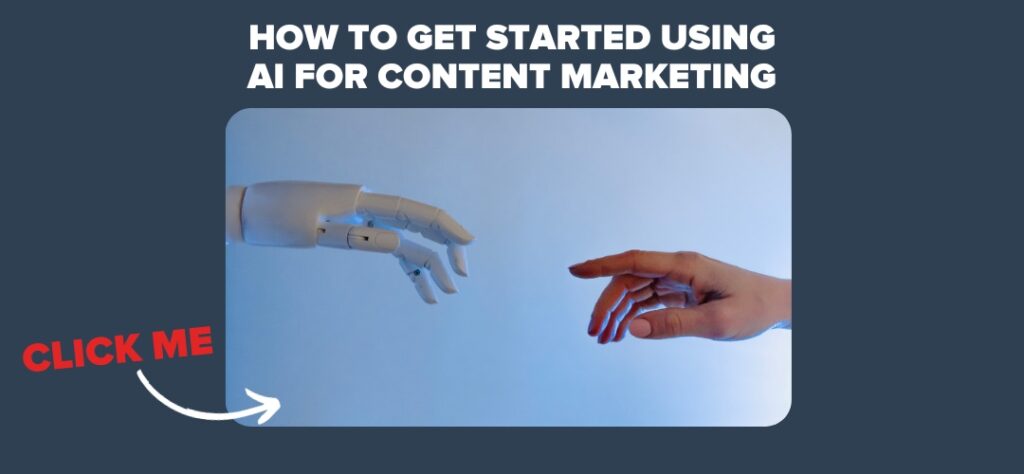“I’ve heard of AI improving business operations, marketing, and sales, but how exactly?” Amidst all the buzzwords and tech jargon that seem to surround the topic of artificial intelligence, one thing stands clear – AI is revolutionising businesses across the board. But what if you’re feeling a bit overwhelmed or unsure about diving into the world of AI? You’re not alone. Many business owners and executives are left scratching their heads, wondering about the tangible benefits of AI, if it’s the right fit for their organisation, and where to even begin.
In this article, you’ll uncover a clear understanding of what AI really means, without the tech-heavy jargon.
But more importantly, you’ll see how AI can be a game-changer for your business – regardless of your industry or company size.
By the end of this article, you’ll be well-equipped to decide if AI should be your next strategic move and how you can implement AI in your business.
What Exactly is Artificial Intelligence (AI)?

Picture this: It’s the 1950s, and computer scientists have a vision. They imagine machines that can simulate human intelligence, performing tasks like problem-solving, pattern recognition, and even understanding natural language. Fast forward to today, and this vision is not just a reality, but it’s rapidly evolving and expanding its influence.
But let’s strip away the complexity: At its core, artificial intelligence (AI) is the capability of a machine to imitate intelligent human behaviour. Instead of performing a repetitive task that it’s been programmed to do, an AI system uses algorithms and vast amounts of data to make decisions, learn from them, and continuously improve.
So, when you ask Siri to play your favourite song, get product recommendations on Amazon, or even when you’re reading this article with insights powered by AI, you’re interacting with Artificial Intelligence.
It’s like having a smart assistant that learns from experiences, but without the human limitations of fatigue or bias.
Maybe AI sounds too futuristic for your business?
Think again.
It’s already here, integrated into various sectors, and there’s a high chance you’ve interacted with it without even realising.
The Different Faces of AI

If you’ve ever thought of AI as a singular, all-encompassing entity, you wouldn’t be alone. Many see it like this, but in reality, AI is diverse and multifaceted. Depending on its function and capability, AI can be categorised into several types.
Let’s explore some of the most popular ones and their applications:
- Machine Learning (ML): This might sound familiar. Machine learning is a subset of AI that focuses on giving machines the ability to learn from data. For instance, Netflix’s recommendation system? That’s ML in action, adapting and improving its film and TV show suggestions based on your viewing habits
- Deep Learning: Think of this as machine learning on steroids. Deep learning uses neural networks (inspired by our brain’s structure) to process data. It’s responsible for things like facial recognition systems and self-driving cars
- Natural Language Processing (NLP): Ever chatted with a customer service bot online? NLP enables machines to understand and respond to human language. It’s the magic behind Siri, Alexa, and other voice-activated assistants
- Robotic Process Automation (RPA): Automating repetitive tasks? That’s where RPA steps in. From data entry to processing transactions, RPA bots can mimic human actions and perform mundane tasks efficiently
- Cognitive Computing: Imagine a system that mimics human decision-making processes. Cognitive computing does just that, combining ML, NLP, and more to interact naturally with humans. IBM’s Watson, which can diagnose diseases and offer treatments, is one example
Regardless of your industry or scale, there’s a form of AI that can cater to your specific needs. Whether it’s automating routine tasks, enhancing customer interactions, or driving data-driven decisions, there’s probably something for your business.
How Can AI Be Used in Your Business?
How can AI actually impact your business? Let’s delve into some tangible advantages that AI brings to the table.
1. Operational Efficiency
Time is a valuable asset in business, and AI can save a lot of it. By automating routine tasks, AI can reduce operational costs and free up your team to focus on more strategic activities. Whether it’s sorting through vast databases, automating customer responses, or streamlining supply chains, AI can handle it.
2. Enhanced Customer Experience
With AI, personalisation is not just feasible; it’s scalable. Imagine offering each customer a unique shopping experience based on their preferences, browsing history, and purchasing habits. Chatbots, recommendation systems, and automated customer support can significantly enhance the user experience, leading to increased brand loyalty and sales.
3. Data-Driven Decisions
Gone are the days of gut-feeling decisions. With AI, you can harness the power of data analytics to gain insights into customer behaviours, market trends, and potential risks. Making informed, data-driven decisions can be the difference between thriving and just surviving in today’s competitive business landscape.
4. Risk Reduction
AI can predict and mitigate potential risks. For instance, in finance, AI tools can forecast market fluctuations or identify potential frauds. In manufacturing, predictive maintenance can prevent costly machine downtimes.
5. Innovation and Product Development
AI isn’t just about improving existing processes; it can be the catalyst for creating new products or services. For instance, health-tech companies are now developing AI-powered diagnostic tools, and entertainment platforms are using AI to create content based on user preferences.
6. Scaling Capabilities
AI can help businesses scale operations without proportionally increasing costs. As demand rises, AI systems can handle the increased workload, allowing companies to grow without compromising on quality or efficiency.
7. Content Creation and Optimisation
AI models like ChatGPT can assist in generating content, from blog posts to social media copy. Additionally, tools like MidJourney and AdCreative.ai can produce images and videos based on text prompts, significantly reducing content creation time.
AI can also help optimise existing content for maximum search visibility. It can analyze more data than any human, providing personalised ranking recommendations to maximize the potential of existing content.
Common Concerns and Misconceptions Surrounding AI
1. “But my business is in a non-tech industry; is AI relevant?”
Absolutely. AI isn’t just for tech giants. From agriculture, where AI helps in predicting crop yields, to fashion, where it assists in trend forecasting, AI finds its relevance in many industries. If there’s data, there’s a way for AI to add value.
2. “Will AI replace human jobs in my company?”
It’s a valid concern, but the reality is more complicated. AI will automate repetitive tasks, yes, but it also creates opportunities for new roles and allows employees to focus on more strategic, creative aspects of their jobs. It’s not about replacement, but enhancement.
3. “What if AI makes a mistake?”
Like any tool, AI isn’t perfect. However, with proper training, monitoring, and feedback, the accuracy of AI systems can be continually improved. It’s also essential to use AI as an assistant rather than a sole decision-maker, especially in critical areas.
4. “I’ve heard AI can be biased. Is that true?”
AI systems learn from data. If the data fed to them is biased, they can make biased decisions. This is why it’s crucial to ensure diverse and representative data training and to continually check AI outputs for fairness and neutrality.
5. “Is AI expensive to implement?”
Costs can vary based on the complexity and scope of the implementation. However, even small businesses can find cost-effective solutions that offer a significant return on investment. If you want to see some cost-effective AI tools check them out here.
6. “Doesn’t AI mean less personal touch in business processes?”
Not necessarily. AI can handle repetitive tasks, but the human touch remains irreplaceable in areas requiring empathy, understanding, and relationship-building. Think of AI as a tool that frees up more of your time for essential customer connection initiatives.
Getting Started With AI
After reading this article you’re probably raring to get started with AI… but where do you start exactly?
The best place to start may be with your content marketing efforts. We developed a guide on how to use AI for Content Marketing here.













